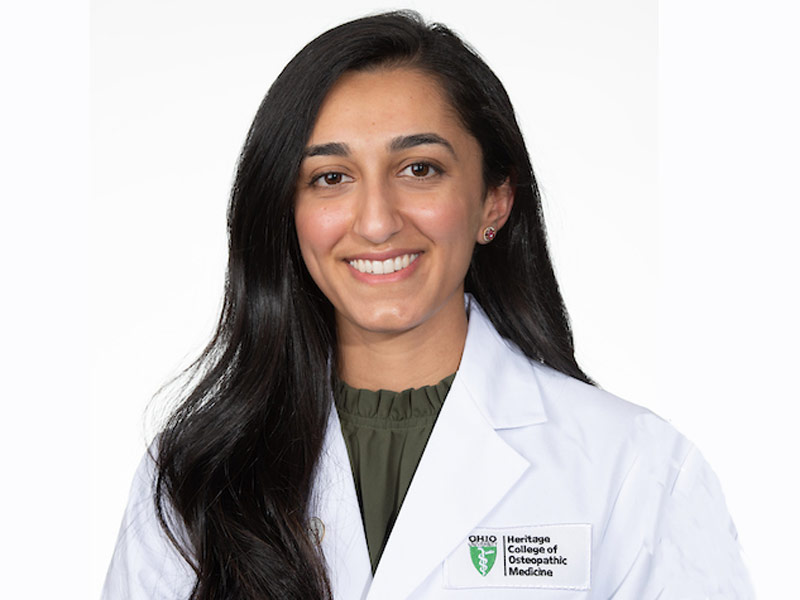Commission Brings DEI Lens to Work Across AAFP
An Update From Student Representative Nidha Khan, M.P.H.
April 28, 2023, News Staff — The AAFP’s Commission on Diversity, Equity and Inclusiveness in Family Medicine has been working since last year to help inform and guide the Academy’s recommendations, policies and efforts that address disparities in care, health and the workforce.

AAFP News recently spoke with Nidha Khan, M.P.H., the commission’s student representative, about the CDEI-FM’s work so far, what members can expect in the coming months and more. The conversation has been edited for brevity and clarity.
What made you want to join the Commission on Diversity, Equity and Inclusiveness in Family Medicine?
Prior to beginning medical school, I worked as a maternal and child health professional. During that time, I saw first-hand the apparent health inequities in our society and learned about the detrimental effects they have on our communities. Part of the reason I decided to go back to school to become a physician was to play my part in reducing these inequities. I believe that each community deserves to have health care professionals who will work to ensure that all of their patients feel valued and respected as equal members of society.
When I learned about CDEI-FM I knew I wanted to join because of how well I related to their mission. I felt like my previous work experience could add valuable input into our discussions as a commission.
What happens at a typical meeting?
CDEI-FM members serve as liaisons to other AAFP commissions. We attend those commission meetings and aim to integrate ourselves so we can understand the work they are doing and act as advisors to them on any DEI-related issues that naturally arise. Then, we convene as the CDEI-FM and discuss updates from the other commissions, their current projects, and what we can do to support their work.
The issues we discuss range from reviewing current AAFP policies from a health equity perspective, all the way to researching pathway projects. We really don’t shy away from incorporating ourselves into the work the AAFP is doing at every level to ensure consistency across all sectors within the organization.
How does the commission’s work shape Academy policies and recommendations?
CDEI-FM work is going to help the organization integrate this health equity lens into everything it does. We don’t want DEI to be an afterthought, we want to help incorporate it at every step of the process to ensure that each program, policy, and recommendation is carefully thought through and appropriately communicated to members.
Health disparities, diversity in the specialty and increasing pathways for minorities into family medicine are at the forefront of the issues CDEI-FM discusses at each meeting. Instead of working on these projects in silos, we hope that the commission will be able to incorporate these themes across the work that is already being done at the Academy. This way we can maximize efficiency and resources to ensure that the work that is being done is well-designed and sustainable.
What can members look forward to in the coming months?
Members can keep an eye out for CDEI-FM members at various Academy events. We are here to help point members in the right direction to reputable, reliable resources that can be used at every step.
What have you learned during your time on the commission?
The amazing thing about this position for me is how much I have learned from my colleagues. I believe that a true understanding of DEI comes from convening individuals from all walks of life together to discuss their experiences and share their perspectives. Only then can we begin to understand the adversities our neighbors are facing and come together to ensure that we create programs, policies and recommendations that are leveled so that everyone has a fair opportunity to attain their full potential, and no one is disadvantaged from achieving this potential for any reason.
As a third-year medical student, I enjoy applying what I learn from this commission into my clinical training to become the best clinician I can be for my community. I feel like I am building a strong foundation that I hope to continue expanding upon for the rest of my career.
We’re having this conversation in April, National Minority Health Month. What does the month mean to you as a family physician and AAFP member?
For me, Minority Health Month serves as a platform for us to share our experiences providing high-quality health care to minority patients throughout the year. It is a time where we can reflect upon things that have gone well and things we can improve on as a medical community for our minority patients.
I believe that when we come together to share our experiences, we will find creative solutions toward equitable opportunities that demonstrate that everyone is equally valued and deserving of high-quality health care.
From the Academy, I appreciate opportunities to convene and discuss minority health issues at a national level. This opens doors for networking events to help connect family physicians to other professionals that can support in providing care to minority patients.
Can you share a closing thought?
As a female, Pakistani-American Muslim, I understand what it can feel like to be a minority with specific health care needs. I know how it feels when you perceive your health care professional is dismissive of you and when they take the time to learn about what is important to you with regard to your health.
Having been on the receiving end as a patient is a humbling experience, which I channel into my own clinical training to ensure that I provide high-quality, equitable health care to every patient I encounter. That is why sharing my experiences this Minority Health Month and talking about the efforts the Academy is putting into incorporating DEI into everything they do is so meaningful to me.